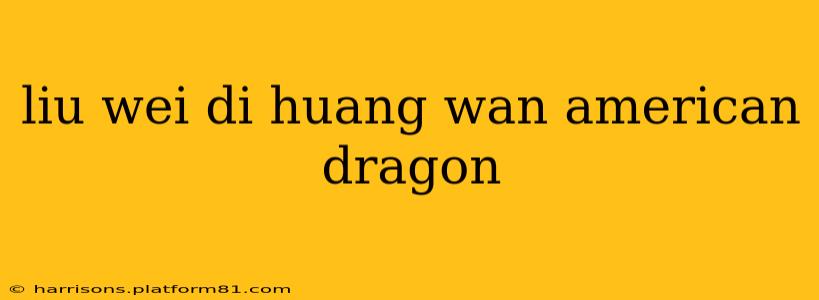Liu Wei Di Huang Wan: Understanding This Traditional Chinese Medicine (TCM) Formula
Liu Wei Di Huang Wan (六味地黄丸), often shortened to LWDHW, is a renowned traditional Chinese medicine (TCM) formula with a rich history. It's primarily used to nourish the kidneys and address a wide range of symptoms associated with kidney deficiency, particularly in the context of TCM theory. While it's gaining popularity in the West, understanding its application and potential benefits requires careful consideration. This comprehensive guide explores LWDHW, clarifying its uses, benefits, potential side effects, and considerations for those looking to incorporate it into their health regimen.
What is Liu Wei Di Huang Wan used for?
LWDHW targets kidney deficiency, a concept in TCM that encompasses a broad spectrum of health issues. These issues aren't necessarily related to kidney function in the Western medical sense but rather to the kidney's role in TCM as a vital energy center related to overall vitality, reproductive health, and bone strength. Some common conditions associated with kidney deficiency, and where LWDHW may be considered, include:
- Fatigue and weakness: LWDHW aims to replenish kidney qi (vital energy), addressing feelings of exhaustion and low energy.
- Frequent urination (especially at night): This can be a symptom of kidney deficiency in TCM, and LWDHW may help to regulate urinary function.
- Dizziness and tinnitus: These sensory issues can sometimes be linked to kidney deficiency, and the formula may help alleviate these symptoms.
- Premature aging: TCM links kidney function to aging, and LWDHW's rejuvenative properties are often touted for slowing down the aging process.
- Reproductive issues: In men, it may be used to support male reproductive health; in women, it can sometimes be considered for menopausal symptoms linked to kidney deficiency.
- Bone and joint problems: The kidneys are associated with bone health in TCM, so LWDHW might be used as a supportive measure for issues like osteoporosis (though it’s not a replacement for conventional treatment).
What are the ingredients of Liu Wei Di Huang Wan?
LWDHW's effectiveness is attributed to its six key ingredients, all carefully chosen for their synergistic effects on kidney function within the framework of TCM:
- Rehmannia glutinosa (熟地黄): This is the cornerstone herb, known for its nourishing and blood-enriching properties.
- Cornus officinalis (山茱萸): Supports the kidneys and helps to strengthen the essence.
- Moutan Cortex (牡丹皮): Known for its anti-inflammatory and blood-cooling properties, balancing the formula.
- Poria cocos (茯苓): Helps to nourish and regulate the kidneys.
- Alisma plantago-aquatica (泽泻): Helps regulate water metabolism, reducing fluid retention.
- Asparagus cochinchinensis (山药): Known for its nourishing effects on the spleen and kidneys.
Is Liu Wei Di Huang Wan safe? What are the potential side effects?
Generally considered safe when used as directed, LWDHW can still cause some mild side effects in certain individuals. These may include:
- Gastrointestinal issues: Some people experience mild digestive upset like nausea or loose stools.
- Allergic reactions: Rarely, allergic reactions can occur.
- Interactions with medications: It's crucial to consult a healthcare professional before using LWDHW, particularly if you are taking other medications, as interactions are possible.
Who should not take Liu Wei Di Huang Wan?
Pregnant or breastfeeding women should avoid LWDHW. Individuals with certain medical conditions, such as kidney disease (in the Western medical sense), should consult a healthcare professional before use. It's important to emphasize that LWDHW is not a substitute for conventional medical treatment.
Does Liu Wei Di Huang Wan interact with other medications?
Yes, potential interactions exist. Always discuss LWDHW with your doctor or pharmacist, especially if you're on other medications, particularly those affecting kidney function or blood pressure.
How should I take Liu Wei Di Huang Wan?
Dosage and duration vary depending on individual needs and the specific condition being addressed. Always follow the instructions provided by a qualified healthcare practitioner who understands both Western and TCM principles. Self-medication can be risky.
Where can I buy Liu Wei Di Huang Wan?
LWDHW is widely available online and in some health food stores. However, ensuring the quality and authenticity of the product is paramount. Look for reputable suppliers who adhere to strict quality control standards. Consult a qualified TCM practitioner for guidance on purchasing and usage.
Conclusion:
Liu Wei Di Huang Wan is a complex herbal formula with a history of use within Traditional Chinese Medicine. While anecdotal evidence and some studies suggest potential benefits for certain conditions, it is vital to consult a qualified healthcare professional before using LWDHW. Self-medication can be dangerous and should be avoided. LWDHW should be considered a complementary therapy and not a replacement for conventional medical care. Remember that this information is for educational purposes only and does not constitute medical advice. Always consult with a healthcare professional for any health concerns.
